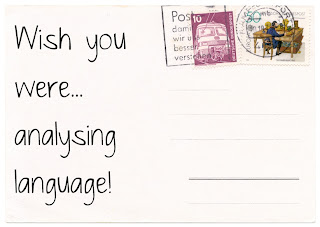Being able to comment on the effects of language choices is essential to achieving grade C and above in GCSE English. Nonetheless students often struggle with this, getting tangled up in knots listing any literary terms they can remember and forgetting that the foundation of all language is words.
A recent way that I have tried to re-focus students on the importance of word choices was by using postcards. A colleague recommended cutting up a text and sticking a small section of it onto blank postcards so that a larger extract could be unpacked by students in more detail.
I tried this out with a year 10 class last week, in a lesson on ‘Of Mice and Men.’ I had never taught this class before and found out moments before beginning the lesson that they had never read the book. Trying to get the students to answer the question ‘How does the language in the extract influence your view of Crooks?’ suddenly seemed not only foolish but impossible.
However, the postcard method really worked! I provided students with three different colours of pen to help them annotate the extract, by focussing on three different types of description. Breaking up the text on the postcards, forced the students to really examine the words used by Steinbeck. The different coloured pens allowed them to quickly visualise how Steinbeck’s word choices worked together (or apart). The feedback session was really fruitful as we were able to explore how Steinbeck’s use of words varied and developed across the text and how this related to the historical context.
The best ideas are often the simplest and this is a really simple one. Breaking up a text into smaller chunks is certainly not a new suggestion and using coloured pens to annotate is something I am sure we have all done before. Putting these two together, however, allowed these students to untangle language choices rather than getting tied up in knots with literary terms.



